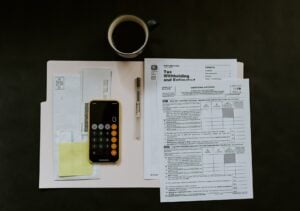A CPA (Certified Public Account) is an accountant that is licensed by the state of Alabama. To become licensed, you must meet specific examination, education, and experience requirements. Here is a more detailed look into what it takes to become a CPA in Alabama.
Here are the Steps to Become a CPA in Alabama:
- Getting Your CPA Education in Alabama.
- Taking the Uniform CPA Exam in Alabama.
- Gaining the Needed Experience in Alabama.
- Getting Your CPA License and Continuing Education in Alabama.

Because CPAs are responsible for a wide range of financial services, individual states must maintain a level of quality and experience before designating a license. Accountants are responsible for auditing financial statements, prepping and filing tax returns, offering financial advice, and providing financial services to businesses and individuals.
To become a CPA in Alabama, you should have a bachelor’s degree in accounting or a related field from an accredited institution, complete 150 hours of semester hours, and pass the exam in the state. These hours can come from courses online and on campus.
Education
Those looking to become a CPA in Alabama must meet specific educational requirements. The Alabama State Board of Public Accountancy sets these requirements. The requirements include having a bachelor’s or master’s degree from an accredited institution. This degree must include 150 semester hours. The coursework breakdown is as follows:
Accounting Courses
Candidates must complete a minimum of 33 semester hours of upper-level courses. This should include topics such as finances, auditing, taxation, management, government, non-profit, and related electives.
Business Courses
In order to be considered, you must also complete at least 27 semester hours of business courses. These courses include:
- Economics,
- The legal and social environment of business,
- Business law,
- Marketing,
- Finance,
- Organization, group, and individual behavior,
- Quantitative applications in business, and
- Communication skills.
Business Ethics Course

Additionally, students must complete a three-semester-hour course in professional ethics. Topics include ethical reasoning, codes of conduct, and professional standards.
As these are the minimum requirements set by the Board of Public Accountancy, applicants may choose to take additional courses in related fields.
Applying for Licensure
Individuals applying for their CPA license in Alabama must be U.S. citizens and legal residents of the state at least 19 years old. Candidates can apply for their license through the Board of Public Accountancy if the above requirements are met.
Exam
Alabama is considered to be a two-tier state. This means that prospective CPAs must first pass the exam and then gain work experience before receiving their license.
There are four sections of the exam, and each section has its own fee. Currently, these fees are around $200 per test and about $800 in total. There is an additional application fee of $100, making the full exam cost close to $1,000.
The American Institute of Certified Public Accountants administers the exam, and the questions are designed to test candidates in a wide range of business concepts. Here is a closer look at the four sections of the exam.
Auditing and Attestation (AUD)
This section covers auditing procedures. Candidates must show the ability to evaluate audit evidence and assess risk. They must also demonstrate their knowledge of legal obligations.
Business Environment and Concepts (BEC)
This test includes business, economics, finance, and technology. Candidates must demonstrate that they can effectively analyze business scenarios, interpret financial statements, and apply corporate governance and risk management concepts.
Financial Accounting and Reporting (FAR)
Topics such as financial principles, reporting standards, and transactions are evaluated through the FAR portion of the exam. Candidates must demonstrate that they can apply these principles to complex transactions, prepare financial statements in accordance with “generally accepted accounting principles” (GAAP), and understand what regulatory bodies do when it comes to financial reporting.

Regulation (REG)
The regulation portion of the Alabama CPA exam covers ethics, business law, and taxation. Test takers must be familiar with federal taxation laws, the legal obligations of businesses and individuals, and ethical standards within the profession.
Each section of the exam must be completed within four hours, and applicants must score a minimum of 75 on each portion in order to pass. The tests are offered on a continuous testing basis so that prospective CPAs can take the exam year-round.
Once candidates pass the exam, they will then need to complete the American Institute of Certified Public Accountants’ continuing professional educational course, which is called Professional Ethics: The AICPA’s Comprehensive Course On-Demand (For licensure).
Professional Ethics Course
The professional ethics course encourages CPAs to apply honesty, professional conduct, and objectivity in their work. Accountants will learn about the AICPA Code of Professional Conduct as well as the rules that apply to government auditors. They will also learn about the ethics needed for professional tax services. A 90% or higher is required to qualify for licensure.
Experience
Before receiving their license, accountants must have proven work experience, which they must show to the Board of Public Accountancy. This work experience must be at least one year of full-time employment by a public accounting firm and be supervised by a CPA in Alabama who has been practicing for at least two years.
If CPAs do not meet the above requirement, they can substitute this with two years of full-time employment in a related field, such as at a government agency. They can also fulfill this requirement by teaching at a college level for two years. Related fields include auditing, tax preparation, financial reporting, and advisory services.
Those in government-related fields must have auditing responsibilities at a government agency. Teachers must have taught related courses at a university or college accredited by the Southern Association of Colleges and Schools or a regional equivalent.
Once work experience requirements have been met, candidates must submit all work experience documentation. This includes a verification form signed by their supervisor as well as a description of their responsibilities.
Licensure Requirements
Education Requirements and Transcripts
A minimum of a bachelor’s degree from an accredited university or college, as well as 30 additional semester hours, are required. All transcripts must be sent to the Board of Public Accountancy for review and have the institution’s official seal and original signature. On top of taking and passing the exam, a three-semester-hour course in professional ethics must be completed and passed with a 90% average or higher.
Taking The Exam
Candidates must pass all four exam sections with a 75 or above. Four windows are offered throughout the year, and prospective CPAs must pass all four sections within 18 months. On the day of the exam, test takers will need,
- Completed, signed, and notarized application with a 2″ x 2″ photograph.
- A cashier’s check or money order for the fees, made out to the Board of Public Accountancy.
- On the day of testing, two forms of identification are required.

Experience Requirements
Prospective CPAs must have a minimum of one year of work experience in accounting or two years in a related field. A licensed CPA must verify this work experience and submit proof of employment.
License Renewal
Once licensed, a CPA in Alabama must complete continuing education requirements, including a minimum of 40 hours every two years and at least four hours in ethics. There are many ways to complete this requirement, but using resources such as this list is important as you work through those hours. Continuing education not only maintains licensure in Alabama but also helps CPAs stay up to date on current professional trends and standards.
Reciprocity
Alabama recognizes what is known as “reciprocity of CPA licenses” from other states. This means that if candidates have been licensed by other states that Alabama recognizes, they do not have to sit for the state exam again. Those who wish to convert their license need to submit the Application for Certificate by Reciprocity form. Additional requirements to have a license converted include the following:
- Licensure grades.
- A “Letter of Good Standing” from the state board that issued the license.
- A background check.
- Required work experience.
- A $100 registration fee.
Alabama also recognizes international reciprocity. However, international accountants must take the NASBA’s International Qualification Examination (IQEX), which costs around $800.
Keeping Your License Active
Individuals gain their license; they must continue to maintain it. These requirements are the “Continuing Professional Education Requirements,” and they are as follows:
- 40 hours of CPE requirements for every two-year reporting period.
- At least eight hours of accounting and auditing CPE.
- A minimum of two hours of ethics CPE.
- No more than 12 hours of the 40 in personal development CPE.
- No more than 10 hours of the 40 earned by the Nano Learning delivery method.
All certified public accountants must keep records of their continuing education activities in case the State Board asks for proof of any CE requirements. Remember that failure to follow the CE requirements may result in disciplinary action by the Board, which can include the suspension or revocation of your license.
The CPA Rules

Every state applies different rules. Besides licensing and continuing education requirements, professional conduct and peer reviews are also important.
- Professional conduct: Licensed accountants must follow the rules laid out by the Alabama Accountancy Act and the Board’s Rules of Professional Conduct. These rules prohibit dishonesty, fraud, or gross negligence when practicing.
- Peer review: Firms that perform reviews of financial statements must undergo a peer review by a qualified independent reviewer every three years. The Alabama Society of CPAs offers this program.
- Disciplinary action: The Board can investigate and discipline those who violate the rules of professional conduct. This includes imposing fines, suspending licenses, and even revoking licenses completely.
Taking the Next Step
Accountants in Alabama that are looking to separate themselves from other applicants should consider earning the highly prestigious CPA designation. It is highly respected in both business and financial communities and represents a symbol of expertise in the field.
Related Resources
What is a Bachelor’s in Accounting Degree?
Online Master’s in Accounting
Guide to the CPA Exam
